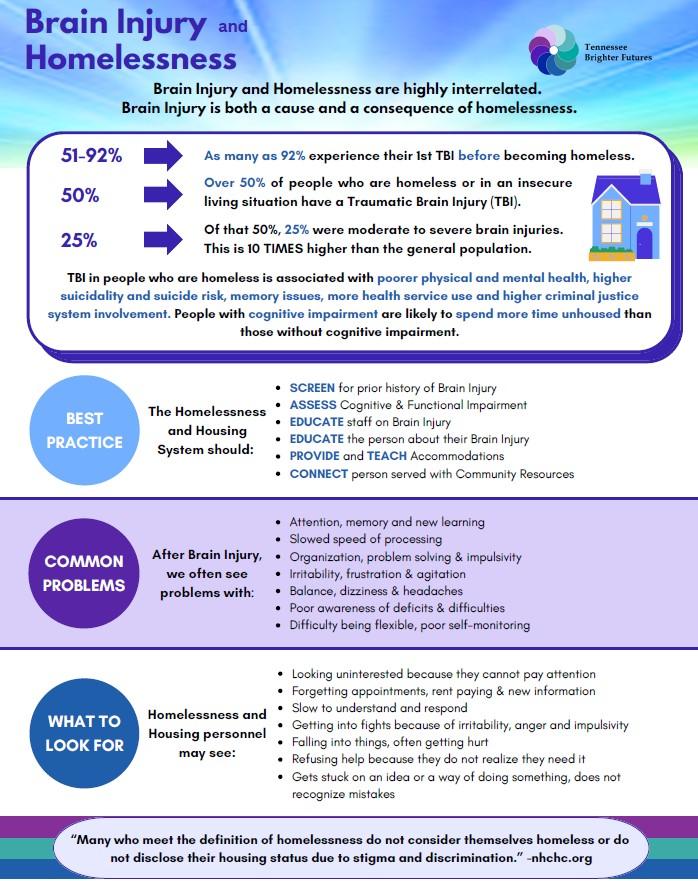About Homelessness
Tennessee and National Numbers:
According to the U.S. Department of Housing and Urban Development, there were an estimated 9,215 people experiencing homelessness on a single night in Tennessee in 2023. Of those, 1,600 (17%) were families with children. The US Department of Housing and Urban Development
On Jan 5, 2017, the Tennessee Department of Mental Health and Substance Abuse Services (TDMHSAS), released an action plan to end chronic homelessness in the Volunteer State. The collaborative plan brings together multiple federal, state, county, and local government agencies, and community partners providing a systematic approach to help eliminate homelessness over the next 10 years.
According to the January 2022 Point in Time Count, 582,462 people were experiencing homelessness in America (roughly 18 out of every 10,000 people.) The vast majority (72 percent) were individual adults, and 28 percent were people living in families with children. National Alliance to End Homelessness
Intersectionality with Brain Injury
Traumatic Brain Injury is both a cause & consequence of homelessness. Over half of those who are homeless or are in an insecure living situation have a TBI. Twenty-five percent of those were moderate to severe brain injuries. (10Xs higher than the general population). They have poorer general health and functioning than people who are homeless without brain injury. More than half experience their first TBI before becoming homeless. People who are homeless and have a TBI are more likely to report childhood trauma or violence.
Common Challenges in people who are homeless and have a TBI include: memory and new learning, attention, speed of processing, headaches, dizziness and balance Issues, problem-solving, impulse control, communication, irritability, frustration and agitation. These changes may make it harder to budget, apply for housing, pay rent, hold a job, maintain a property, remember appointments, remember to take medication, communicate needs, and be aware that they need services. Best practice when working with someone with a TBI who is homeless is to screen for prior history of Brain Injury, screen for deficits if they have a prior history, teach them to use accommodation and have staff use accommodations, and follow up more often and longer.
Screening Tools
For Homelessness, screening is for other co-occurring needs. See TBF website for related Resource pages.
NASHIA’s OBISSS (Online Brain Injury Screening and Support System)
Ohio State University TBI Identification Method
Vulnerability Index - Service Prioritization Decision Assistance Tool (VI-SPDAT)
Crisis Intervention Tools
Homeless Veteran: 1-877-424-3838
Veteran Crisis Line: 1-800-273-8525
Tennessee Websites
Tennessee Statewide 2-1-1 Resource Network: Please call 2-1-1 for listings of shelters in Tennessee
TDMHSAS, Housing and Homeless Services: Supports the housing needs of people living with mental illness, helping them find stable living situations to support their recovery.
Tennessee Continua of Care by Care Region: A Continuum of Care (CoC) is a regional or local planning body that coordinates housing and services funding for homeless families and individuals, primarily using funding received through U.S. Department of Housing and Urban Development (HUD).
HUD identifies four necessary parts of a continuum:
- Outreach, intake, and assessment
- Emergency shelter
- Transitional housing
- Permanent and permanent supportive housing
US Dept. of Housing and Urban Development, Tennessee Search for TN Services & Homeless Info
TN Department of Education Homeless Students Education Program: McKinney-Vento and Immigrant Grant
TN Chapter of the National Alliance to End Homelessness
Nashville Homeless Planning Council
Metro-Nashville Office of Homeless Services
Chattanooga Regional Homeless Coalition
Knoxville Area Rescue Ministry
Tennessee Valley Coalition for the Homeless serves Anderson, Blount, Campbell, Claiborne, Cocke, Grainger, Hamblen, Jefferson, Loudon, Monroe, Sevier & Union Counties. Hotline 888-556-0791
Charitable Health Care
Tennessee Charitable Care Network: The Tennessee Charitable Care Network supports, educates, and represents non-profit organizations that provide charitable health care services to low-income, uninsured, and underserved Tennesseans
Find Medical Care:
National Websites
National Coalition for the Homeless To speak with a caring person at any time, call 1-800-Miss-You to reach Miracle Messages, or 988 for the Suicide & Crisis Life Line.
National Alliance to End Homelessness is a nonpartisan organization committed to preventing and ending homelessness in the United States.
National Health Care for the Homeless Council Their mission is to build an equitable, high-quality health care system through training, research, and advocacy in the movement to end homelessness.
Adapting Your Practice: Recommendations for the Care of Patients Who Are Homeless or Unstably Housed Living with the Effects of Traumatic Brain Injury Full PDF of the guidelines
Valor on the Fax Housing concept in Colorado exclusively for those experiencing homelessness with Brain Injury
Administration for Community Living (ACL) Housing and Resources Services Center
TN Brighter Futures groups that are a part of this System of Care:
- TDMHSAS, Housing and Homeless Services
- Nashville Homeless Planning Council
- Nashville Rescue Mission
- Chattanooga Regional Homeless Council
- Knoxville Area Rescue Ministry
- Tennessee Homeless Solutions
- Memphis Veterans Affairs’ Medical Center Homeless Program
- TN Department of Education McKinney-Vento and Immigrant Grant
- Compassionate Hands
- Metro Office of Homeless Services
- Volunteer Network
Contributors:
Allison Cantway, Assistant Director of Planning and Research · Metro Nashville Office of Homeless Services
Neru Gobin, Director, Office of Housing and Homeless Services, TDMHSAS
Jeff Craig, Coordinated Entry, Memphis VA Homeless Program
Lakesha Herron, HCHV Outreach, Memphis VA Homeless Program
McKinney-Vento Act, A. Cantway_PPT
Housing and Homeless Services_N. Gobin_PPT
VA Homeless Program & Services for Homeless Veterans_J. Craig_PPT






